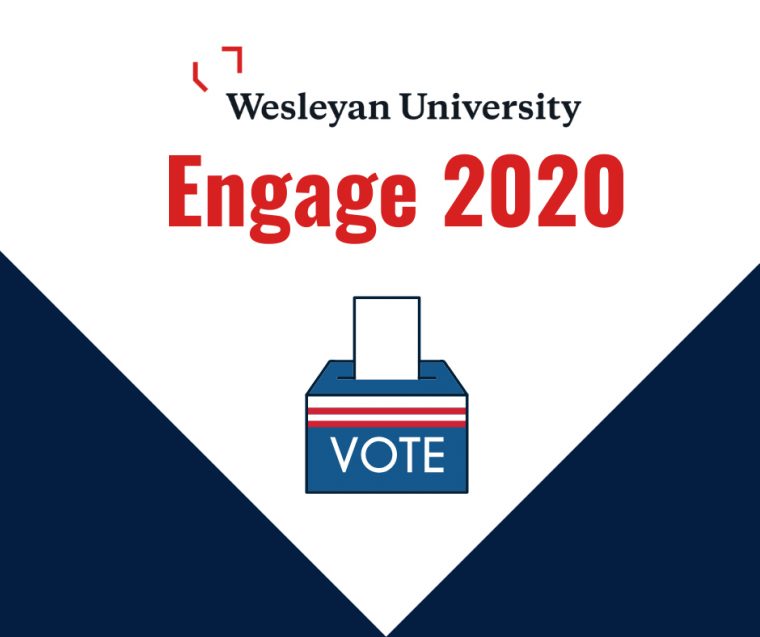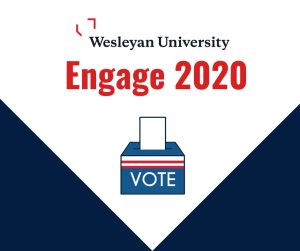Engage 2020 Off to a Running Start

 Wesleyan’s new Engage 2020 Initiative (E2020) is facilitating student educational experiences in the public sphere ahead of the 2020 elections. As part of this initiative, Wesleyan also is highlighting the contributions of higher education more broadly in promoting democracy.
Wesleyan’s new Engage 2020 Initiative (E2020) is facilitating student educational experiences in the public sphere ahead of the 2020 elections. As part of this initiative, Wesleyan also is highlighting the contributions of higher education more broadly in promoting democracy.
Over the past few months, Wesleyan President Michael Roth ’78 has been speaking with other higher education leaders about the “shared responsibilities of higher education institutions for developing civically engaged citizens and contributing to the civic life of the United States.”
While the particulars of this work may look different at each institution, leaders at schools around the US have registered their commitment to three core principles:
- Developing civic preparedness is a core element of the mission of American higher education.
- Participating in American political life helps students learn from a diversity of ideas and people while developing skills for lifelong, active citizenship.
- Empowering students and teachers to engage with the complex issues facing the country are crucial facets of higher education’s contributions to the common good.
So far, over 60 other colleges and universities have joined Wesleyan in affirming these principles. These schools represent a broad cross-section of higher education, including public and private institutions, liberal arts colleges and research institutions, secular and religious colleges. A full list of these institutions, which will be continually updated as new schools sign on, can be viewed here.
In December, Wesleyan announced E2020 as a comprehensive university effort to support student learning through the combination of civic work and liberal arts education. Students wishing to volunteer in the public sphere over academic breaks may apply to the E2020 Fund for support for associated transportation and living expenses, and enroll in CSPL494—a quarter-credit course that involves orientation, structured reflection, and a final paper. Wesleyan is also offering a curated selection of over 20 related courses and speakers and events. For example, on Feb. 19, students will share reflections on their winter session E2020 experiences, and on Feb. 26, a panel will discuss, “2020 Elections, Grassroots Organizing, and Criminal Justice Reform.”
Over winter break, 18 students traveled to a variety of locations around the US to support voter registration and issues advocacy groups, as well as a range of political campaigns. Some sought to educate young people about the electoral process and mobilize them to vote; others worked on issues such as immigration, criminal justice reform, housing justice, and reproductive rights. Several students volunteered for campaigns—ranging from presidential candidates to a contender for County Sheriff—and spent hours walking around neighborhoods, knocking on doors, and having (at times, uncomfortable) conversations with local residents about issues of concern.
“Over the last several years, pundits have been complaining that students today are either coddled snowflakes afraid of confrontation or militant social justice warriors hell-bent on imposing their values on others,” Roth said. “These caricatures are belied by the thousands of students around the country who engage with fellow citizens in the public sphere, and who over the next several months will do their best to help make our democracy work.”
He added, “Higher education contributes in so many ways to the public good, and empowering thoughtful participation in our political system is surely one of them. We want to help shine a bright light on this vital work at colleges and universities around the U.S. Students are more likely to thrive when they engage in the public sphere, and our democracy can really thrive if they do so!”

